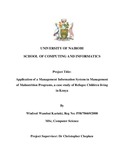| dc.contributor.author | Kariuki, Winfred W | |
| dc.date.accessioned | 2016-04-20T11:18:43Z | |
| dc.date.available | 2016-04-20T11:18:43Z | |
| dc.date.issued | 2015 | |
| dc.identifier.uri | http://hdl.handle.net/11295/94377 | |
| dc.description.abstract | Persons who flee their country of origin because of war, famine or discrimination experience malnutrition due to lack of access to healthy food or/and water during flight or after arrival at the country where they have sought asylum. A majority of people who flee for safety are usually women and children. Children are mostly affected by malnutrition.
Data collection is a key activity for organizations that are involved in malnutrition management programs. In the current setting there is heavy reliance on manual registers for collecting data from the children affected by malnutrition. This has proven cumbersome and time consuming particularly for organizations that are involved in data collections. The teams involved in this processes have to spare time to do data entry and later data analysis in order to come up with meaningful data for decision support. This also causes delays and duplication of effort in managing malnutrition related functions. This can be reduced by implementing a comprehensive Management Information system which would support the decision making process in the whole lifecycle of malnutrition management. This would also enable real-time recording and analyzing of malnutrition related data by all partners involved in malnutrition management which would in turn support faster and efficient decision making, thus leading to better service delivery.
This research project focused on finding out how a Malnutrition Management Information System can be applied in management of malnutrition related activities on a real-time basis. The information system would allow access to common platforms where all actors in the malnutrition management program can update and share information to support decision making.
Part of the research was to design a prototype to demonstrate how a Management Information System would be used to enhance malnutrition management. The prototype comprised of a mobile application which would be used to collect data during routine monitoring of the affected population and a web based system which would be used to manage the resources in the malnutrition management programs. These applications were interconnected to enable real time update of data and enhance monitoring and evaluation. An evaluation was done to demonstrate efficiency of a malnutrition management information system platform. The outcome of the evaluation indicated that the platform would be efficient in managing malnutrition as long as the
4
appropriate technology and proper training was applied when implementing the system. The prototype would also be scalable in case there was increase in affected population. | en_US |
| dc.language.iso | en | en_US |
| dc.subject | management of malnutrition programs | en_US |
| dc.title | Application of a management information system in management of malnutrition programs, a case study of refugee children living in kenya | en_US |
| dc.type | Thesis | en_US |

